#korean vocab
Text
One-Page Masterlist
안녕하세요! Hey everyone! I recently got an ask about my old masterlist, which is the same as my broken-down masterlist except it has all of my lessons on one page, rather than on multiple separate posts. Some may find this expanded version easier to navigate, so I’ll keep this up for y’all! My broken-up masterlist, of course, will still be available for those who find that more helpful :)
Hangul Lessons
Consonants
Vowels
Writing/Reading Korean Syllables
Some 받침 Rules
Diphthongs
Stroke Order
Some More 받침 Rules
Irregular Verbs
The Basics
Common Phrases
Numbers
Sino-Korean vs. Native Korean Numbers (Instagram Post)
Sentence Structure and Particles
Present-Tense Conjugations and Formal Language
Adjectives
Questions
Honorifics and Casual Language
Beginner
Negative Sentences
잘 and 못
Past Tense
Future Tense (-ㄹ / 을 것이다)
-ㄹ / 을 까요? (Shall we…? / I wonder…?)
-(으)세요 (Giving Commands / Asking Questions)
Telling Time
-고 싶다 (I want to…)
How to Say “And”
-지만 (However)
아/어/여서 (So…)
Negative Commands
Spacing (띄어쓰기)
Adverbs
ㅂ Irregular
Comparatives and Superlatives
난, 날, & 내가
Upper-Beginner
-(으)면 (If…)
아/어/여도 (Even though…/Even if…)
(으)면 되다 / 아/어/여도 되다 (I can…/You may…)
-아/어도 되다: Asking for and Giving Permission (Instagram post)
-(으)면 되다 & -(으)면 안 되다 (Instagram post)
아/어/여야 되다 and 아/어/여야 하다(Have to / Should)
Present Progressive (-고 있다)
How to Say “Or”
-아/어/여하다
All About 중
How to Use -(으)로
Before & After
-ㄴ/은 채로
Intermediate
Describing Nouns with Verbs (-는 것)
Describing Nouns with Verbs - Past & Future Tense (-ㄴ/은 / -ㄹ/을 것)
Nominalization
것 같다 (I think… / It seems…)
-러 가다 / -러 오다
-(으)려고 (In order to…)
-기로 하다 (to Decide to do Smth)
척하다 (To Pretend)
-게 되다
-군요 / -구나
아/어/여 보다 (to try…)
-은/ㄴ 적 있다 / 없다 (I have / have not)
-ㄹ/을 게요 (Future Tense)
겠다
-ㄹ/을 수 있다/없다 (I can / cannot)
-ㄹ/을 때 (When…)
-ㄴ/는다면 (If)
-(으)면서 and -(으)며
-(으)니까 (Because / So)
-아/어/여주다
-(ㄴ/는)다 (Narrative Form)
Quoting
Let’s…
Quoting continued
(으)ㄹ래요? (Wanna…?)
-죠
-대로
More Quoting - 대 & 래
잘하다 & 못하다 vs. 잘 하다 & 못 하다
-아/어 가지고
-(으)려면
-는 길에 & -는 길이다
-(으)면 vs. -ㄴ/는다면 (Instagram Post)
-았/었을 것이다
-느라고
-는 데(에)
-ㄹ/을 뻔하다
Upper-Intermediate
-ㄴ/는데
-(으)ㄴ/는지 (Whether or not)
-(이)라는…
All About 아무리
-잖아요
Expressing Surprise
-시 (Honorific)
Making Comparisons
-아/어/여지다
I might…
So that…/To the point where…
Causative Verbs
시키다
Passive Verbs (part 1)
Passive Verbs (part 2)
-ㄴ/은가 보다 & -나 보다 (I guess…)
-ㄹ/을수록
Other Meanings of 싶다
-자마자 & -는 대로(As soon as…)
-긴 하다
-치고
-김에
차라리 (Rather)
-(으)ㅁ Nominalization
-기는 무슨 & -기는 개뿔
-고 보니까
-듯(이)
버리다
-(으)면 좋겠다 & -(으)면 하다
-길 바라다
Advanced
-거든(요)
-줄 알다/모르다
-ㄹ/을 테니까 and -ㄹ/을 텐데
-았/었던
아니라 and 대신에
-ㄹ/을 리가 없다
편이다, 별로, and More
-지 그렇다 (Why don’t you…?)
-ㄹ/을 걸
-ㄹ/을 까 보다
-다면서요
-다니 part 1
-다니 part 2
뜻이다 & 말이다
-다가
-더라고(요)
-더니
Some colloquialisms: 아니시에이팅 and 뭐 이렇게
-(으)ㅁ Sentence Ending
-다 보니까
What does 따위 mean?
-ㄴ/는데도
Korean Idioms
Vocabulary
Must-Know People
Must-Know Places
Must-Know Things
Must-Know Verbs
Must-Know Adjectives
Countries
Months, Days of the Week, and More
Clothing (옷)
School (학교)
Autumn (가을)
Autumn (w/Pictures!)
More Questions
House / Apartment (집 / 아파트)
Emotions / Feelings ( 감정)
Animals (동물)
Loan / Konglish Words
Food and Drink (먹을 것과 마실 것)
Parts of the Body (몸)
Counters
Modes of Transportation (교통 수단)
Colors (색깔)
Colors (with Pictures!)
Weather (날씨)
Winter (겨울)
Music & Instruments (음악과 악기)
Baking Gingerbread Cookies
Emergency (비상)
Hygiene & Bathroom (위생 & 화장실)
Indefinite Pronouns
Work / Office (일 / 사무실)
Spring (봄)
Coronavirus Prevention (코로나바이러스 방역)
How to Wash Your Hands (손을 씻기)
Time (시간)
Korean Cuisine (한식)
Summer (여름)
Summer (여름) w/Pictures!
Graduation (졸업)
Identity (독자성)
Korean Text Slang
Similar Words
Makeup w/Pictures! (화장품)
Family (with Pictures!)
Pronouns
How to Say “Still” and “Already” in Korean
Tastes & Textures (맛과 질감)
K-Pop Audition
K-Pop Fandom Terminology
Different Ways to Say “Change”
Flower Names
What Does 원래 Mean?
What does 오히려 Mean?
College
Hanja Lessons
최
수
악
식
급
동
부 & 불
애
출
퇴
예
음
중
학
습
연
생
대
입
인
문
감
과
원
특
만
후
무
Charts
Present, Past, and Future Tense
Question Words
잘 vs. 못 and Negative Conjugations
Future Tenses
-았/었던 vs. -던 (at end of lesson)
Particles
Some 받침 Rules
Gifving Commands
Conjunctions and -아/어/여서 vs. -(으)니까
-(으)면 vs. -다/라면 and Different Ways to Say “And”
How to Say “Or” (at end of lesson)
Telling Time (at end of lesson)
Comparatives and Superlatives
잘하다 & 못하다 vs. 잘 하다 & 못 하다 (at end of lesson)
Comparing 잘하다/못하다, 잘 하다/못 하다, & 수 있다/수 없다
Irregular Verbs
Pop Quizzes
Level 1
K-Pop Breakdowns
TXT - “Cat & Dog”
Twice - “Feel Special”
Enhypen - “Fever”
2NE1 - “Go Away”
Lee Hi - “Only”
“기억을 걷는 시간 (Time Spent Walking Through Memories)”
KCM - “An Old Love Story (흑백사진)”
Taeyeon - “Can’t Control Myself”
Epik High - “Lost One”
Colde - “A Song Nobody Knows”
IU - “My Sea”
Enhypen - “Polaroid Love”
유라 (youra) - “하양 (RAL 9002)″
BTS - “Ddaeng”
Stray Kids - “For You”
Woozie - “어떤 미래 (What Kind of Future)
TXT - “Eternally”
LOONA - “Heart Attack”
Stray Kids - “Muddy Water”
LOONA - “Girl Front”
Pentagon - “Daisy”
BTS - “Sea”
Semester in SK
Nami Island (남이섬)
Things to Buy at Daiso
Shopping Phrases
Ordering Coffee
Signs in Korea
Ordering at a Restaurant
Riding the Seoul Subway
Things at the 편의점
Korean Curse Words
Etiquette in South Korea
Drinking Culture
Hanja in Real Life
Holidays in South Korea
Korean Cuisine
Concert Ticketing in South Korea
K-pop Comebacks in Korea
Summer in South Korea
What I Learned
#korean#korean language#hangul#korean grammar#korean vocab#korean vocabulary#learn korean#learning korean#langblr#Korean langblr#masterlist#apok#apopofkorean#study korean#studying korean#kpop#kpop lyrics#basic korean#beginner korean#intermediate korean#advanced korean#hanja#한국어#한글#한자#한국어 공부하기#한국어 배우기#한국어 문법#한국어 어휘#초급 한국어
2K notes
·
View notes
Text
한국 전래동화에 나오는 어회와 문법 ! - Vocabulary and grammar in traditional Korean fairytales !
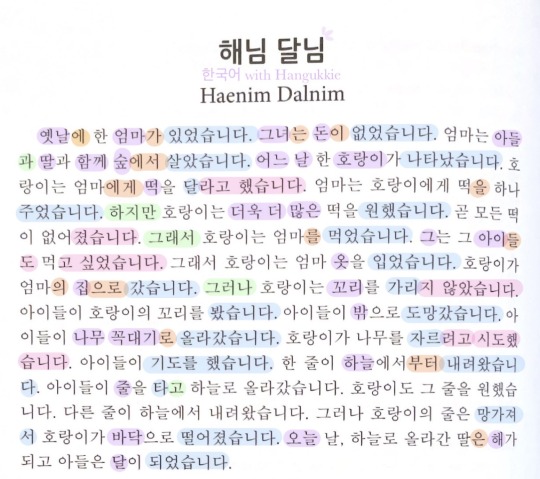
English Translation:
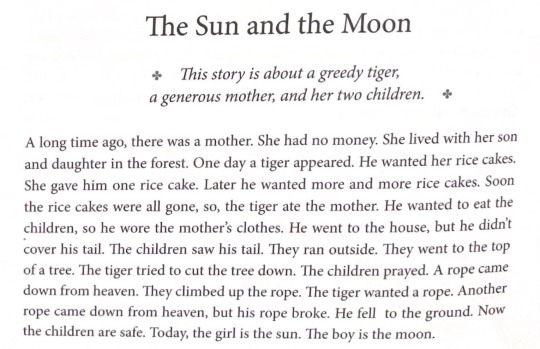
———————————————————
Vocabulary:
옛날 - Olden days
옛날에 - Once upon a time
어머니/엄마 - Mum
그녀 - She/Her
돈 - Money
아들 - Son
딸 - Daughter
함께 - Together
숲 - Forest
어느 - Which
날 - Day
호랑이 - Tiger
떡 - Rice cake
더욱 더 - More and more
많이/많은 - Many/A lot
그 - He/Him
아이 - Kid/Child
아이들 - Kids/Children
옷 - Clothes
집 - House
꼬리 - Tail
밖 - Outside
나무 - Tree
꼭대기 - The top
하늘 - Sky
줄 - Rope
바닥 - Floor
오늘 - Today
해 - Sun
달 - Moon
Grammar - Verbs:
있다 - To exist
없다 - To not exist
살다 - To live
나타나다 - To appear
달다 - To ask/To request (In this context)
주다 - To give
원하다 - To want/To wish/To desire
먹다 - To eat
가다 - To go
가리다 - To cover
보다 - To see
도망가다 - To run away
올라가다 - To go up
자르다 - To cut
기도를 하다 - To pray
내리다 - To get off
떨어지다 - To fall
된다 - To become
Grammar - Sentence Forms:
라고 하다 - For indirect quotations
지다 - To become
도 - Too/Also/As well as
고 싶다 - To want
지 않다 - Is not
려고 - To intend to
시도하다 - To attempt to
Grammar - Connectives:
과 - And/With (With 받침)
하지만 - But
그래서 - So
그러나 - But/However
하고 (고) - And/With
Grammar - Markers/Particles:
에 - To/At (Location and time marker)
가 - Subject particle
는 - Topic particle
이 - Subject particle (With 받침)
에서 - At/In/On/From (Location marker)
에게 - To/For
을 - Object particle (With 받침)
를 - Object particle
들 - Plural marker
의 - Possessive marker
으로 - By/As/For/To/Towards/With (Directional marker)
로 - By/As/For/To/With (Directional marker - with 받침)
부터 - From/Since (Location and time marker)
은 - Topic particle (With 받침)
#korean language#korean langblr#korean#langblr#korean study blog#korean studyblr#study blog#studyblr#korea#korean vocab#korean vocabulary#korean vocab list#Korean stories#Korean fairytales#Korean folktales#korean folklore#한국#한국어#한국어 공부#한국어 읽기#한국어 어휘#한국어 단어#한국어 문법#공부#읽기#어휘#단어#문법#한국 전래동화#전래동화
364 notes
·
View notes
Text
Korean Slang [UPDATED]
I logged into tumblr for the first time in like YEARS and found out that I promised an updated Korean slang post 2 years ago😅
갓생 (gat-saeng) ➡️ "that girl" lifestyle, someone who's productive
고인물 (go-in-mul) ➡️ someone who's played a game for a long time
꾸안꾸 (kku-an-kku)➡️ no-makeup makeup
누물보(nu-mul-bo)➡️ "who asked?"
띵언 (dding-eon)➡️ a good quote
머선129 (meo-sun-il-e-gu) ➡️ what's going on
무물보 (mu-mul-bo)➡️ ask me anything
반모(ban-mo)➡️ banmal mode (not use honorifics)
성덕(sung-deok)➡️ successful fan (a fan whose met their idol)
식집사 (sik-jip-sa)➡️ plant mom/dad
스불재(seu-bul-je)➡️ self-inflicted disaster
알잘딱깔센(al-jal-ttak-kkal-sen)➡️ doing something well/perfectly on your own
어쩔티비 (eo-jjeol-tee-bi)➡️ "what are you gonna do"
억텐 (eok-ten)➡️ (I have a lot to say but I won’t say it)
워라벨(wo-la-bell) ➡️ work life balance
자만추 (ja-man-chu)➡️ (hurts my heart)
케바케 (ke-ba-ke)➡️ case by case
아아 (ah-ah)➡️ ice americano
주불(ju-bul)➡️ tell me your address
킹받네(king-bat-ne)➡️ something/someone is annoying
#korea#korean#learn korean#korean vocab#korean words#korean word of the day#korean vocab list#korean slang#langblr#languageblr
407 notes
·
View notes
Text
Different words meaning 'to use'.
이용하다 - to utilise something for the beneficial facility or function it offers (can also refer to taking advantage/exploiting in a negative way)
쓰레기통을 이용하세요 = please use the trash can
이용자 = a user/visitor of a facility or space
인터넷 이용자 = a user of the internet
도서관 이용자 = a library goer
사용하다 - to use, operate or employ a tool of some kind
컴퓨터를 사용해도 되나요? = May I use the computer?
사용설명서 = instruction manual (lit. usage + explanation + document)
사용자 = consumer/utiliser of something
스페인어 사용자 - user(speaker) of Spanish
유용하다 - to possess uses/functions, able to be utilised positively
병을 여는 데 아주 유용해요 = it's useful/great for opening bottles
유용한 표현을 배우야 해 = you must learn useful/useable phrases
쓰다 - to use or employ something or wear (in terms of some accessories) (also means 'to write' and 'to be bitter'.)
돈을 썼어 = I spent my money
안경을 쓰는 사람 = a person who wears glasses
이것은 어디에 쓰는 겁니까? = where/what is this used for?
연필을 쓰세요 - please use a pencil (whereas 연필로 쓰세요 would be please write in pencil
tldr: 쓰다 is more simple and common in speech but is essentially the same as 사용하다. 이용하다 has a different nuance of referring to making use of a facility offered by an object or space (e.g. using the bathroom, the internet, public transport) rather than 쓰다/사용하다 being the personal, often physical, manipulation of a thing (e.g. using toilet paper, using photoshop, using a pencil). 유용하다 is not about the actual use of something, more a remark on something's ability to be used/useful. The recurring ~용 character of these words comes from the Chinese/Hanja 用 which refers to use, function, utilisation, consumption.
#korean#korean language#korean langblr#langblr#studyblr#korean studyblr#korean vocab#korean grammar#korean verbs
119 notes
·
View notes
Text
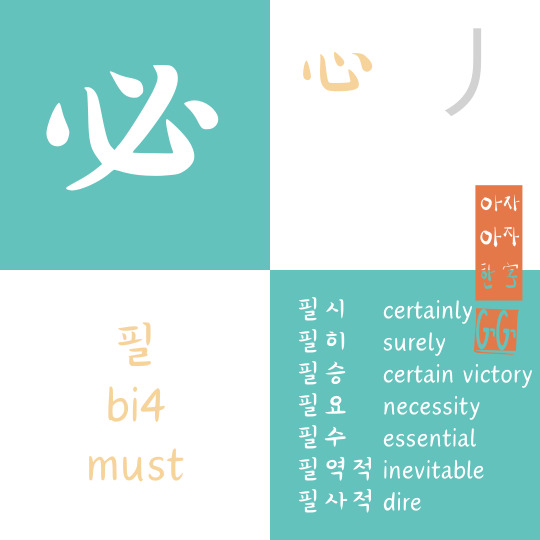
必 bi4 필
if you'd like to support me, check out my ko-fi!
character story:
It is necessary to follow your 丿일 one and only 心 심 heart to live a happy life.
Study vocab here!
Vocab:
필시 Certainly
필히 Surely
필승 Certain victory
\필요* Necessity
필요하다 to need (I need, we need, etc)
필요있다 to be necessary
필수** Being essential
필수과목 required course
필수조건 essential condition
필수품. Necessities
필연적. Inevitable
필사적 Desperate/dire
#5lvl#family: heart#필#bi4#alt:#korea#korean#korean language#korean learning#hanja#korean study#study korean#korean vocabulary#korean langblr#hanja vocab#hanja vocabulary#korean vocab#langblr#language#chinese characters#studyblr#original#ajaajahanja
55 notes
·
View notes
Text
Agust D - Amygdala [lyrics+vocab]

I don't know your name
I don't know your name, yeah
I don't know your name
요즘 기분은 어때?
I don't know your name, your name, your name
기억들로 여행
지우고픈 일들
요즘 기분은 어때, 어때, 어때?
▫ 요즘 - lately
▫ 기분 - mood
▫ 요즘 기분은 어때? = How have you been feeling lately?
▫ 기억 - memories
▫ 여행 - travel, trip
▫ 지우다 - to erase
지우고픈 일들 = 지우고 싶은 일들 = Things I want to erase
천구백구십삼
내가 태어난 달
엄마 심장의 수술, 수술, 수술
별의별 일이 많았지
뭐가 이리 다사다난한지
기억조차 안 나는 기억도
다 꺼내 보자고 하나씩
다 꺼내 보자고 하나씩
▫ 태어나다 - to be born
▫ 달 - month
▫ 심장 - heart
▫ 수술 - surgery
▫ 별의별 - all kinds of, various
▫ 다사다난하다 - to be eventful
▫ 꺼내다 - to take out
▫ 하나씩 - one by one
최선들의 선택
다음 차선들의 선택
차차 선들의 선택, 선택, 선택, yeah
원치 않던 일들
내 통제 밖의 일들
자 집어넣자 하나둘
그래 하나둘, 그래 하나둘
▫ 최선 - the best
▫ 선택 - choice, decision
▫ 차선 - the second best
▫ 원하다 - to want
▫ 통제 - control
▫ 밖 - outside, out of
▫ 집어넣다 - put sb into, throw sb into
I don't know your name, your name, your name
기억들로 여행, 여행, 여행
I don't know your name, your name, your name
자 지워보자 하나씩, 그래 하나씩
My amygdala (My amygdala)
어서 나를 구해줘 어서 나를 구해줘
My amygdala (My amygdala)
어서 나를 꺼내줘 어서 나를 꺼내줘
My amygdala (My amygdala)
My amygdala (My amygdala)
이곳에서 구해줘 어서 빨리 꺼내줘, yeah, yeah
▫ 어서 - hurry, fast
▫ 구하다 - to save
▫ 이곳 - this place, here
▫ 빨리 - fast
Uh-uh, 그래 참 별의별 일이 많았지
Uh-uh, 귓가엔 엄마 심장 시계 소리
Uh-uh, 전하지 못했던 내 사고 소식과
스케줄 중에 걸려 온 전환 아버지의 간암 소식
(Woah-oh) 최선의 선택들이 맞았었길
(Woah-oh) 그 또한 모두 지나가 버렸기에
그래서 이 수많은 고통은 날 위한 것일까
끊임없던 시련은 날 죽이지 못했고
다시금 나는 연꽃을 피워내
▫ 귓가 - around my ears
▫ 엄마 심장 시계 소리 - the sound of the clock in my mom's heart
▫ 전하다 - to convey
▫ 사고 - accident
▫ 소식 - news
▫ 스케줄 - schedule
▫ 전화가 걸려오다 - to get a phone call
▫ 간암 - liver cancer
▫ 맞다 - to be correct
▫ 지나가다 - to pass
▫ 고통 - pain
▫ 끊임없다 - to be ceaseless
▫ 시련 - ordeal, hardship
▫ 죽이다 - to kill
▫ 다시금 - again
▫ 연꽃 - lotus
▫ 피우다 - to bloom
136 notes
·
View notes
Text
Korean Weather Vocabulary
Watch my lesson on weather in Korean: https://www.youtube.com/watch?v=D0V_FJsVzkI
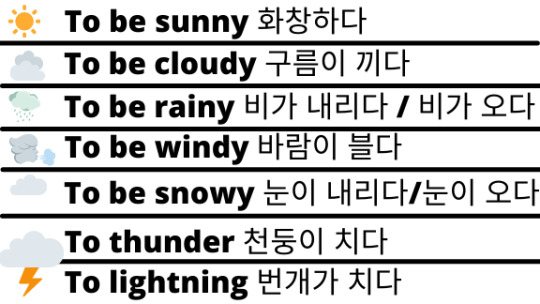
#korean lesson#learn korean#korean#korean vocabulary#korean vocab list#korean vocab#beginner Korean#beginner korean lesson#Korean language#language learning#learning korean#languageblr#language study#langblr#weather in Korean
44 notes
·
View notes
Text
HD'S K-POP BOOKCLUB: Read The Album March 2024: Book 1 & Song 1 Korean Vocabulary Study Lists! (K-pop artists in focus: Aespa)
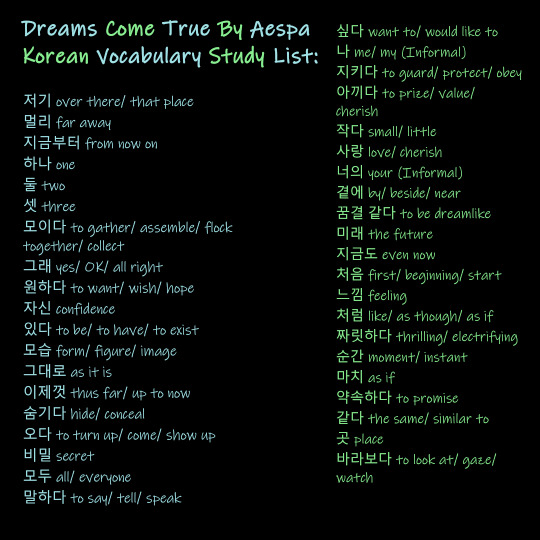
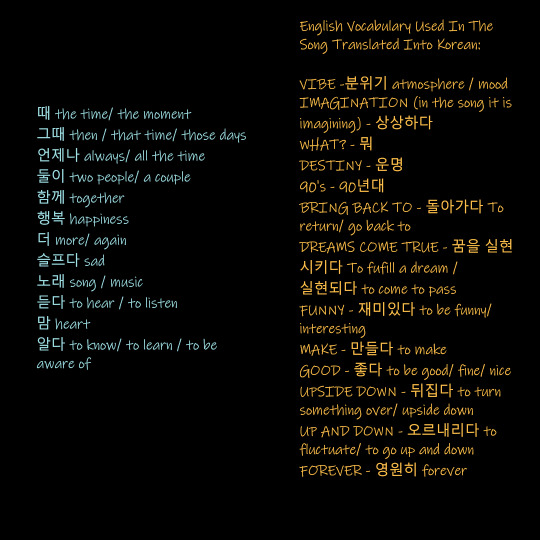


I had so much fun reading the book for this song in the album! Plus I absolutely love this song! Aespa what a bop you have created!
For the vocabulary for the song I used dictionary form verbs so that they would be easier to study and use with other grammar forms
For the book vocabulary I thought of the themes expressed in the book and translated them into korean using an online Korean dictionary.
I hope this helps with your Korean studies and hopefully you enjoy reading DallerGut Dream Department Store!
(If you would like to see what album I read this for and what other books I read for this album, please feel free to check out my previous post!)
Happy Studying Everyone! X
#korean#korean vocabulary flashcards#korean vocab#korean studyblr#korean study blog#studyblr#langblr#kpop#books#korean music#reading#study#한국어
9 notes
·
View notes
Text
random korean vocab
공격하다 - to attack
예감 - premonition, hunch
붙잡다 - to catch, grab
막다 - to block, obstruct
기절하다 - to faint
7 notes
·
View notes
Text

많이 vs 많아요
The first obvious difference would be that 많이 is an adverb and 많다 is an adjective.
많다 (adjective)
Definition: plentiful; many; a lot of
A number, amount, etc., exceeding a certain standard.
Use this when you simply want to describe that there is a large amount or number of something.
Examples:
어린이들은 친구가 많아요. = Kids have lots of friends.
선물이 정말 많아요! = That’s a lot of presents/gifts.
일이 정말 너무 많아요. = It’s too much work.
많이 (adverb )
Definition: much; in large numbers; in large amounts
In a state in which a number, amount, degree, etc., are larger than a certain standard.
This can be used in combination with another verb to describe the amount of something more specifically in relation to the verb. Adverbs usually are placed right before the verb.
Examples:
밥을 많이 먹어요. = I eat a lot (of food).
돈이 많이 있어요. = I have a lot of money.
운동을 많이 했어요. = I exercised a lot
There’s another form of 많다 : 많은
It is used before nouns to describe them. It has basically the same meaning as 많이 and the two can be used interchangeably in almost all cases.
Examples:
많은 사람 = a lot of people
많은 숙제 = a lot of homework
많은 영화 = a lot of movies
많은 책을 읽었어요. I read a lot of books. (Many books, I read)
책을 많이 읽었어요. I read a lot of books.
많이 있어요 vs 많아요.
There’s not much difference between these two. They can be used interchangeably.
Examples:
학생들이 많이 있어요. = There are a lot of students
학생들이 많아요. = There are a lot of students
The only difference is that 많이 can be used with a different verb at the end, but 많다 is a verb itself to it must always be at the end of the sentence.
More Examples Of 많다, 많이, & 많은 :
돈이 많아요! = There’s a lot of money!
돈이 많이 있어요. = I have a lot of money! / there is a lot of money!
많은 돈이 있어요 = I have a lot of money! / there is a lot of money!
돈이 많이 벌었어요! = I earned a lot of money!
많은 친구가 있어요 = I have a lot of friends
남동생은 밥이 너무 많이 먹어요 = My little brother eats too much
많은 열쇠를 갖고 있는데 올바른 열쇠를 찾을 수 없어 = I have a lot of keys, but I can't find the right keys
68 notes
·
View notes
Photo

아틀라스의 형벌 Atlas’s punishment
프로메테우스의 불꽃 Prometheus’s flame
이카루스의 날개 Icarus’s wings
시지프스의 형벌 Sisyphus’s punishment
우로보로스의 꼬리 Uroborus’s tail
55 notes
·
View notes
Text
Semester in SK: Korean Curse Words
안녕하세요 여러분! I’m sharing yet another Instagram post with you all--this one is about a bunch of Korean curse words! Very silly, I know, but curse words are a big part of any language and can be fun to learn about! Of course, be careful when using these and please do not use them often--I’m just sharing them for fun and so you can recognize them if you hear them :) I hope you enjoy! 화이팅!

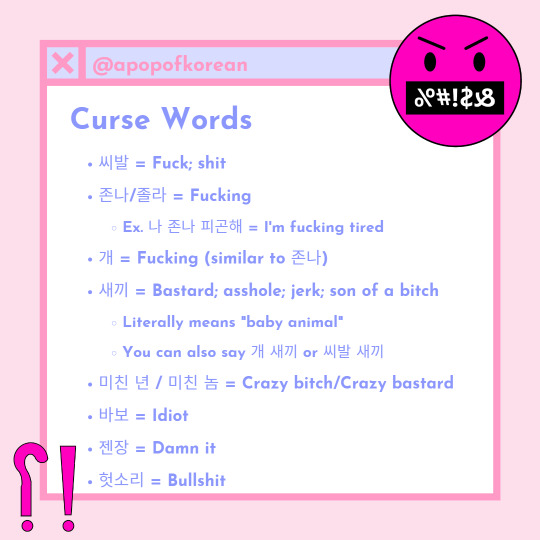
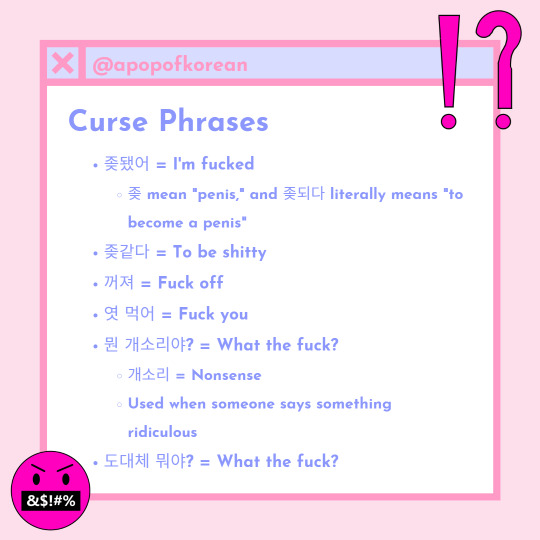
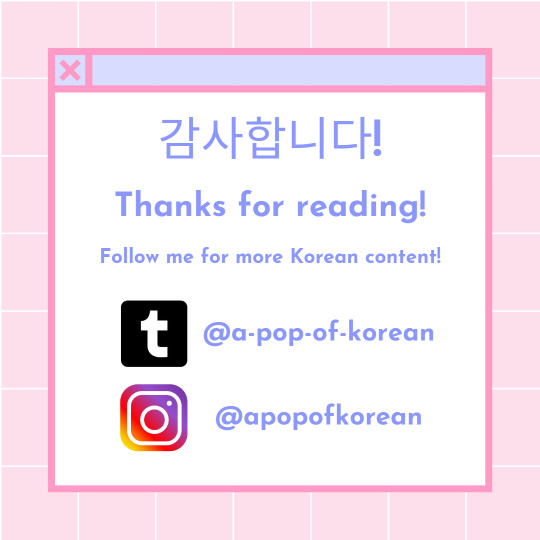
My masterlist
Join my Discord chat here to practice Korean with others!
Follow me on Instagram here for more Korean content!
Get Drops Premium using my affiliate link to expand your Korean vocab!
Check out my Ko-Fi to support this blog and my studies! Thank you for your generosity!
#korean#korean language#korean vocabulary#korean vocab#study abroad#learn korean#learning korean#study korean#studying korean#korean culture#유학#유학생활#한국#한국 문화#어휘#한국어#한국어 공부하기#한국어 배우기#langblr#korean langblr
392 notes
·
View notes
Text
졸업 🎓!! - Graduation 🎓!!




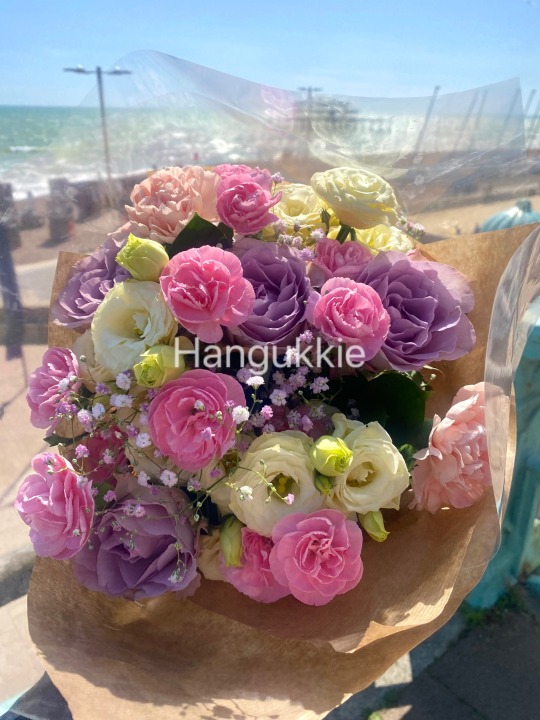




캬아ㅏㅏ~~ 졸업했어요 🥹💐🎓!!
———————————————————
Aaaaaaa!! I graduatedd 🥹💐🎓!!
#I FINALLY GRADUATED AAAAAAAAAA YESSSSSSSS YAHOOOOO WOOHOOOO YIPPEEEEE AJKWNHDBSBEJSJSBWBSHSMKH !!!#korean language#korean langblr#korean#langblr#korean study blog#korean studyblr#study blog#studyblr#korea#korean vocab#한국어 어휘#korean vocabulary#한국#한굴#한국어#어휘#hangul#korean vocab list#한국어 일기#한국어 연습#한국어 공부#졸업#셀카#graduation#personal#졸업식#졸업했어요#university#대학생
46 notes
·
View notes
Text
korean slang [part 1]
문찐 - culture loser, someone who is not interested in or does not know much about pop culture, new trends.
short for 문화찐따 = 문화(culture) + 찐따 (loser).
사진빨 - being very photogenic.
from 사진발, from 사진 (寫眞, photo) + 발 (lines, streaks).
엔조이 - enjoyment, casual romantic relationship.
네덕 - selfish, immature, and conceited fan or poster.
short for 네이버 ("Naver", main South Korean search engine and platform) + 덕후 (otaku, fan), originally because such people were most common on Naver's general blogs, rather than on more specialized platforms.
수포자 - someone who has given up on studying math (in school).
contraction of 수학 포기자.
솔크 - Christmas without a romantic partner.
of 솔로 solo + Christmas. Christmas is considered a romantic holiday in South Korea.
읽씹 - leaving a text or message on read, and not reply.
안읽씹 - intentionally leaving a text or message on unread.
ㄴㅇㅎ - being incomprehensible.
마자마자 - truetrue, yesyes.
호구 - an overly naive and submissive person; pushover.
sino-korean word from 虎口, from 虎 (“tiger”) + 口 (“mouth”). The "pushover" sense derives from the game of Go sense, implying someone who would be submissive enough to be willing to place their stone in such a position.
현자타임/현타 - (vulgar) post-nut clarity or (non-vulgar) a moment when one realizes that what one is doing is actually pointless, reality check.
현자(賢者) + 타임, calque of Japanese 賢者タイム (“post-nut clarity”).
a non-vulgar reanalysis of the above as an abbreviation of 현실(現實) 자각(自覺) 타임 (“reality perception moment”). the new interpretation retains a metaphoric extension of the original meaning, but in a non-sexual way. many Koreans are not aware of the original etymology, and the word has appeared in TV programs for general audiences.
스포당하다 - to accidentally read spoilers (of a film, video game).
눈팅 - only read articles or posts without leaving any comment; lurking.
#korean#korean vocab#korean slang#korean word of the day#langblr#korea#internet slang#한국어#속어#language stuff
16 notes
·
View notes
Text
combination terms
I don't know what else to call these, but they refer to two opposing things that are often referred to together in one phrase to illustrate a breadth of span of the concept.
north and south- 남북 (often refers the two Koreas.)
east and west - 동서
pros and cons - 장점과 단점 can be seen shortened to 장단점. (점 means point)
strengths and weaknesses - 강점과 약점 (similar to above) (강 means strong and 약 means weak)
long and short term - 장기와 단기 can be seen shortened to 장단기 (기 refers to a time period)
up and down - 위아래(로)
side to side - 좌우(로) (좌 refers to 'left' and 우 is 'right' but from Hanja rather than 왼쪽/오른쪽 from native Korean)
here and there - 여기저기(에)
coming and going/back and forth between places - 왔다갔다하다
push and pull - 밀다 당기다 can be seen shortened to 밀당 (can refer to playing hard to get)
30 notes
·
View notes
Text
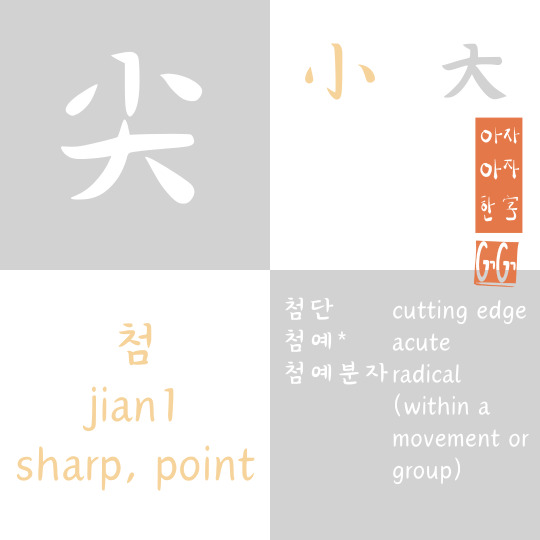
尖 첨 sharp
if you'd like to support me, check out my ko-fi!
character story:
Like a needle, it is 大 대 big at the base and 小 소 small at the tip, making it sharp!
Study vocab here!
Vocab:
尖端 첨단 cutting edge
尖銳 첨예* acute, sharp; radical
尖銳分子 첨예분자 radical person, group within a larger group/movement
*can add 하다 to make a verb form
**can add 이다 to make an adjective form
#3lvl#family: small#family: big#小#大#첨#jian1#alt:#korea#korean#korean language#korean learning#hanja#korean study#study korean#korean vocabulary#korean langblr#hanja vocab#hanja vocabulary#korean vocab#langblr#language#chinese characters#studyblr#original#ajaajahanja
30 notes
·
View notes